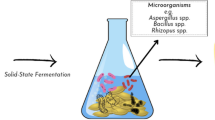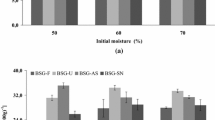Abstract
Brewers’ spent grain (BSG) represents the 85% of the total residue produced during the beer brewing process, with a global annual production volume exceeding 30 Mtons. The current study concerns the application of solid state fermentation (SSF) as a bioprocess where the nutritional value of BSG is improved for further use as animal feed with increased value. The investigated SSF procedure was initiated by the edible fungi Pleurotus ostreatus, which constitutes a natural source of proteins, β-glucans, and various metabolites (vitamins, nutrients, etc.). Herein, the SSF of BSG resulted in a significant increase of protein content by 49.49%, a 10-fold increase of 1,3-1,6 β-glucans, and a respective reduction of cellulose by 11.42%. The application of this method is expected to provide some useful information on the utilization of BSG as substrate for fungi-initiated SSF, a bioprocess allowing the significant reduction of the environmental impact caused by the beer brewing industry and simultaneously producing animal feed with higher protein content and improved nutritional characteristics. Such studies contribute to confront the unavailability of proteinaceous animal feed observed in the last decade.





Similar content being viewed by others
References
Akinfemi A, Adu OA, Doherti F (2010) Conversion of sorghum stover into animal feed with white-rot fungi: Pleurotus ostreatus and Pleurotus pulmonarius. Afr J Biotechnol 9(11):1706–1712
AOAC (1995) Official Methods of Analysis, 14th edn. Association of Official Analytical Chemists, Washigton, DC
Bayitse R, Hou X, Laryea G, Bjerre AB (2015) Protein enrichment of cassava residue using Trichoderma pseudokoningii (ATCC 26801). AMB Express 5:80. https://doi.org/10.1186/s13568-015-0166-8
Bianco A, Budroni M, Zara S, Mannazzu I, Fancello F, Zara G (2020) The role of microorganisms on biotransformation of brewers’ spent grain. Appl Microbiol Biotechnol 104:8661–8678. https://doi.org/10.1007/s00253-020-10843-1
Buffington J (2014) The Economic potential of brewer’s spent grain (BSG) as a biomass feedstock. Adv Chem Eng 4:308–318
Cooray TS, Chenc NW (2018) Valorization of brewer’s spent grain using fungi solid-state fermentation to enhance nutritional value. J Funct Foods 42:85–94. https://doi.org/10.1016/j.jff.2017.12.027
Darwish G, Bakr AA, Abdallah MMF (2012) Nutritional value upgrading of maize stalk by using Pleurotus ostreatus and Saccharomyces cerevisiae in solid state fermentation. Ann Agric Sci 57(1):47–51. https://doi.org/10.1016/j.aoas.2012.03.005
Dubois M, Gilles K, Hamilton KJ, Rebers AP (1951) A colorimetric method for the determination of sugars. Nature 168:167. https://doi.org/10.1038/168167a0
Faostat 2019. http://www.fao.org/faostat/en/#data/FBS. Accessed 12 February 2021
Han LM, An Q, He FS, Zhang LX, Zhang HM, Gao HX, Wu Q, Bian SL (2020) Solid state fermentation on popular sawdust and corncob wastes for lignocellulolytic enzymes by different Pleurotus ostreatus strains. Bioresources 15(3):4982–4995
He Q, Peng H, Sheng M, Hu S, Qiu J, Gu J (2019) Humidity control strategies for solid-state fermentation: capillary water supply by water-retention materials and negative-pressure auto-controlled irrigation. Front Bioeng Biotechnol 7:263. https://doi.org/10.3389/fbioe.2019.00263
Ibarruri J, Cebrian M, Hernadez I (2019) Solid state fermentation of brewer’s spent grain using Rhizopus sp. to enhance nutritional value. Waste Biomass Valori https://doi.org/10.1007/s12649-019-00654-5
Jin Y, Speers AR, Paulson TA, Stewart JR (2004) Barley b-glucans and their degradation during malting and brewing. MBAA TQ 41(3):231–240
Kavalopoulos M, Stoumpou V, Crhistofi A, Mai S, Barampouti EM, Moustakas K, Malamis D, Loizidou M (2021) Sustainable valorization pathways mitigating environmental pollution from brewers’ spent grains. Environ Pollut 270:116069. https://doi.org/10.1016/j.envpol.2020.116069
Khidzir KM, Abdullah N, Agamuthu P (2010) Brewery spent grain: chemical characteristics and utilization as an enzyme substrate. Malaysian J Sci 29(1):41–51
Lao JE, Dimoso N, Raymond J, Mbega RE (2020) The prebiotic potential of brewers’ spent grain on livestock’s health: a review. Trop Anim Health Prod 52:461–472. https://doi.org/10.1007/s11250-019-021209
Liguori R, Soccol RC, Vandenberghe PL, Woiciechowski LA, Ionata E, Marcolongo L, Faraco V (2015) Selection of the strain Lactobacillus acidophilus ATCC 43121 and its application to brewers’ spent grain conversion into lactic acid. Biomed Res Int 2015:1–9. https://doi.org/10.1155/2015/240231
Mathias TRS, Mello PPM, Servulo EFC (2014) Solid wastes in brewing process: a review. J Brew Distilling 5(1):1–9. https://doi.org/10.5897/JBD2014.0043
Miller GL (1959) Use of dinitrosalicylic acid reagent for determination of reducing sugar. Anal Chem 31(3):426–428. https://doi.org/10.1021/ac60147a030
Mussatto IS, Dragone G, Roberto CI (2006) Brewers’ spent grain: generation, characteristics and potential applications. J Cereal Sci 43:1–14. https://doi.org/10.1016/j.jcs2005.06.001
Radosavljevic M, Pejin J, Kocic-Tanackov S, Mladenovic D, Djukić-Vuković A, Mojovic L (2017) Brewers’ spent grain and thin stillage as raw materials in L- (+)-lactic acid fermentation. J Inst Brew 124:23–30. https://doi.org/10.1002/jib.462
Ritota M, Manzi P (2019) Pleurotus spp. cultivation on different agri-food by-products: example of biotechnological application. Sustainability 11:5049. https://doi.org/10.3390/su11185049
Steiner J, Procopio S, Becker T (2015) Brewer’s spent grain: source of value-added polysaccharides for the food industry in reference to the health claims. Eur Food Res Technol 241:303–315. https://doi.org/10.1007/s00217-015-2461-7
Tan XY, Mok KW, Lee J, Kim J, Chen NW (2019) Solid state fermentation of brewers’ spent grains for improved nutritional profile using Bacillus subtilis WX-17. Fermentation 5:52. https://doi.org/10.3390/fermentation5030052
Terrasan FRC, Carmona CE (2015) Solid – State fermentation of brewer’s spent grain for xylanolytic enzymes production by Penicillium janczewskii and analyses of the fermented. Biosci J 31(6):1826–1836
Wang D, Sakoda A, Suzuki M (2001) Biological efficiency and nutritional value of Pleurotus ostreatus cultivated on spent grain. Bioresour Technol 78:293–300
Westendorf LM, Wohlt EJ (2002) Brewing by-products: their use as animal feeds. Vet Clin North Am Food Anim 18:233–252
Xiros C, Christakopoulos P (2012) Biotechnological potential of brewers spent grain and its recent applications. Waste Biomass Valori 3:213–232. https://doi.org/10.1007/s12649-012-9108-8
Zhu F, Du B, Bian XZ, Xu B (2015) β-Glucans from edible and medicinal mushrooms: characteristics, physicochemical and biological activities. J Food Compos Anal 41:165–173. https://doi.org/10.1016/j.jfca.2015.01.019
Availability of data and materials
All data generated or analyzed during this study are included in this published article.
Funding
This research has been co-financed by the European Union and Greek national funds through the Operational Program Competitiveness, Entrepreneurship and Innovation, under the call RESEARCH–CREATE–INNOVATE (project code: T1EDK-04331).
Author information
Authors and Affiliations
Contributions
CE conducted the experiments, analyzed the data, discussed the results, and was a major contributor in writing the manuscript. DA had the idea for the article, designed the experiments, discussed the results, and was a major contributor in writing the manuscript. NC conducted the literature survey, analyzed the data, discussed the results, and was a major contributor in writing the manuscript. GM conducted the literature survey, analyzed the data, discussed the results, and was a major contributor in writing the manuscript. SAH had the general supervision and revised the manuscript. All authors read and approved the final manuscript.
Corresponding author
Ethics declarations
Ethics approval and consent to participate
Not applicable
Consent for publication
Not applicable.
Competing interests
The authors declare no competing interests.
Additional information
Responsible Editor: Ta Yeong Wu
Publisher’s note
Springer Nature remains neutral with regard to jurisdictional claims in published maps and institutional affiliations.
Rights and permissions
About this article
Cite this article
Eliopoulos, ., Arapoglou, D., Chorianopoulos, N. et al. Conversion of brewers’ spent grain into proteinaceous animal feed using solid state fermentation. Environ Sci Pollut Res 29, 29562–29569 (2022). https://doi.org/10.1007/s11356-021-15495-w
Received:
Accepted:
Published:
Issue Date:
DOI: https://doi.org/10.1007/s11356-021-15495-w




